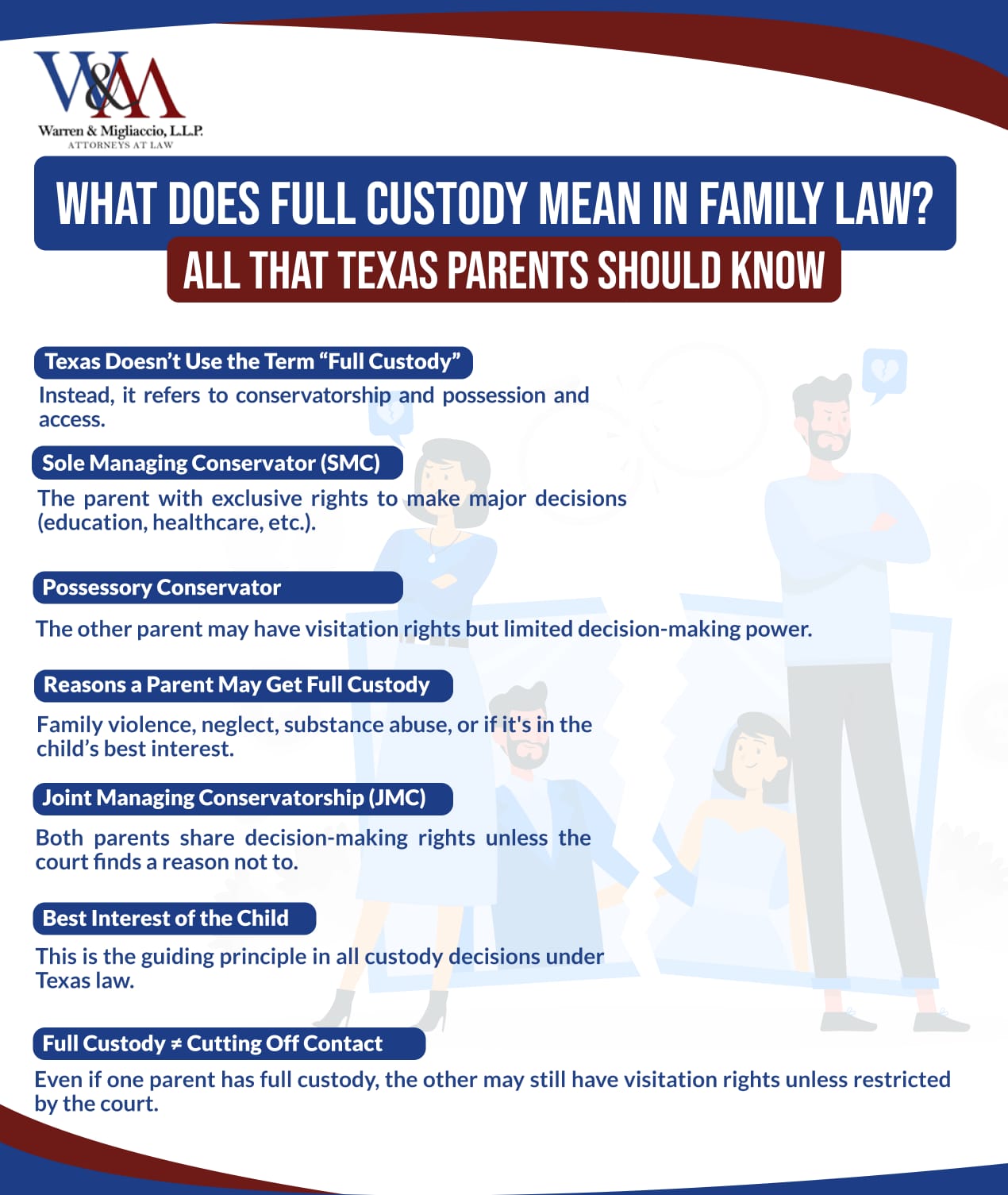Understanding family law terms can feel overwhelming. Many parents ask, “What does full custody mean?”—especially during stressful times like a divorce or separation that involves children. It’s a term people use often, but its legal meaning, particularly in Texas, has specific details related to child custody.
Full custody decisions can have a significant impact on a child’s life, shaping their daily routines, emotional well-being, and overall development.
You’ll learn that knowing what full custody means helps you understand your rights and what’s best for your children, whether you’re going through a divorce or you’re an unmarried couple dealing with custody issues. This knowledge is foundational for any parent involved in custody law proceedings.
Key Points
- Understanding family law terms can feel overwhelming. Many parents ask, “What does full custody mean?”—especially during stressful times like a divorce or separation that involves children. It’s a term people use often, but its legal meaning, particularly in Texas, has specific details related to child custody.
- Demystifying “Full Custody” in Texas
- Conservatorship refers to a parent’s rights and responsibilities over a child’s welfare and child’s upbringing.
- Possession and access deals with how much time a child spends with each parent and how visits are scheduled.
- While “full custody” isn’t the exact legal phrase, the idea exists in Texas custody law. It describes a situation where one parent has most of the authority and responsibility.
Demystifying “Full Custody” in Texas
You might hear “full custody” in everyday talk or see it on TV. In Texas, though, the law uses different words to describe the legal relationship between a parent and a child. These words are “conservatorship” and “possession and access.” Texas child custody laws provide guidance for parents on understanding these terms and their implications.
- Conservatorship refers to a parent’s rights and responsibilities over a child’s welfare and child’s upbringing. Conservatorship involves parental responsibility, including making important decisions about the child’s welfare, such as education and healthcare.
- Possession and access deals with how much time a child spends with each parent and how visits are scheduled.
When people say “full custody,” they usually mean the parent takes on most of the legal and physical responsibilities for the child’s care and upbringing, making most major decisions about the child’s life and having the child living with them most of the time. This parent is often called the primary custodial parent.

While “full custody” isn’t the exact legal phrase, the idea exists in Texas custody law. It describes a situation where one parent has most of the authority and responsibility. Below, we’ll see how this fits under Texas rules and how a custody arrangement is organized.
Conservatorship: The Texas Approach to Custody
Texas law calls parents “conservators.” Conservatorship describes your legal rights and duties to your child. Determining custody involves the court assessing the best interests of the child and the ability of each parent to provide a stable environment. Two main types exist when looking at what full custody can mean in real life. These two types shape how parents split or share the job of raising their children. The family court sets up conservatorship as part of a divorce or a lawsuit known as a Suit Affecting the Parent-Child Relationship. Legal custody involves the right to make major decisions about the child’s education, healthcare, and religious upbringing. If you want to file for child custody in Texas, follow these three straightforward steps.
Sole Managing Conservator (SMC) vs. Joint Managing Conservator (JMC)
A Sole Managing Conservator (SMC) is a parent who has the exclusive right to make most decisions for the child. This is usually what people think of when they ask about what full custody means. Granting custody to only one parent is a significant legal step that courts do not take lightly. This parent has a lot of control over the child’s day-to-day life, holding both sole legal custody and primary sole physical custody in common language.
- An SMC often decides where the child will live and can make choices about education and medical care.
- The SMC can allow or deny certain activities and sign off on crucial decisions.
- This role carries serious responsibility, and family court judges don’t grant it without good reason.
Joint Managing Conservatorship (JMC) is more common. Courts often prefer it because it lets both parents stay involved in the child’s life, resembling joint legal custody or joint physical custody depending on details. With joint custody, the child spends significant time with both parents, and both parents have an equal say in major decisions regarding the child’s upbringing. Legal joint custody means both parents share the authority to make important decisions about the child’s welfare.
- In a JMC, one parent is usually named the primary custodial parent who decides the child’s main home.
- The other parent usually pays child support and shares in decision-making, although the division of responsibilities varies.
- A parenting plan should clearly spell out who decides what. Joint custody is a custody arrangement in which both parents share legal and physical custody, meaning significant time is spent with both.
Related Guides:
Rights and Duties of a Sole Managing Conservator
If a court names you Sole Managing Conservator, you get many key rights that shape the child’s life. These rights include:
- Deciding the child’s main residence (sometimes without geographic limits).
- Receiving child support from the other parent.
- Making choices about the child’s education (school selection, special programs).
- Making non-emergency medical care decisions, such as doctor or dental visits.
- Consenting to the child’s marriage or military enlistment.
- Representing the child in legal actions.
These duties and rights appear in Texas Family Code Chapter 153, and they come with big responsibilities for the child’s well-being.
When is Sole Managing Conservatorship (Full Custody) Awarded?
Texas courts focus on one rule: the best interest of the child. This rule guides every decision about custody arrangements.

Giving one parent sole physical custody (or SMC) is a big deal. Courts usually do this when one parent isn’t suitable due to harmful behavior or when joint legal custody would hurt the child. SMC is often granted when the other parent is deemed unfit due to issues such as abuse, neglect, or substance abuse.
The only exception to the general preference for joint custody is when the child’s safety or welfare is at risk.
Case Study: When One Instance of Abuse Changed Everything
In In re Marriage of Stein, 153 S.W.3d 485 (Tex. App.—Amarillo 2004, no pet.), the Texas Court of Appeals made an important ruling about abuse and child custody. The court decided that just one incident of physical abuse can count as a “history” of abuse under Texas Family Code § 153.004(b).
This landmark decision changed how courts handle custody cases. Before this case, many people thought abuse had to happen multiple times to affect custody decisions. Now, judges can decide that even one documented incident is enough to deny joint managing conservatorship when there’s credible evidence of abuse.
The Stein ruling puts children’s safety first. Courts no longer need to see multiple incidents or wait for a pattern of abuse to develop. This means judges can act faster to protect children from potentially dangerous situations.
This case fundamentally changed how Texas courts evaluate conservatorship in cases involving domestic violence. Even when abuse seems like an isolated event, judges now have the power to limit a parent’s custody rights. This helps ensure children stay safe, which is always the court’s top priority in custody decisions.
Situations Favoring SMC
Reasons Courts Might Choose SMC
- Domestic violence: A history of family violence aimed at the child or the other parent is a major factor.
- Child abuse or neglect: Any proven abuse or severe neglect weighs heavily against joint or equal time.
- Substance abuse: If a parent’s drug or alcohol use creates an unstable setting, SMC may be granted.
- Abandonment: A parent who barely participates in the child’s life or has left altogether can lose many parental rights.
- Criminal history: Serious crimes involving violence or child endangerment raise big concerns in custody disputes.
- Severe mental health problems: Mental health issues, especially untreated conditions that endanger the child’s welfare, can be a determining factor in awarding SMC.
- Parental alienation: When one parent keeps withholding access or interfering with the child’s relationship with the other parent, it may push the court to name an SMC.
- Extreme conflict: If parents can’t make major decisions together, the court might see SMC as necessary. A history of abuse or neglect is a factor that may lead to one parent being granted full custody.
Courts assume joint physical custody or joint legal custody is usually better for the child. To get SMC, you must show strong proof that joint physical custody would not help the child and might even harm them. The courts generally favor joint custody because it allows the child to maintain strong relationships with both parents, unless there are issues like abuse or neglect. Police reports, medical records, witness testimonies, and the like can be vital.
Related Guide: How Can a Mother Lose Custody in Texas?
The Court’s Perspective
Because Texas courts presume JMC is in the best interests of the child, you must give solid evidence to show why one-parent custody (SMC) is needed. In a custody dispute, the court carefully reviews all evidence to determine the most appropriate custody arrangement. An attorney can guide you on gathering police reports, medical or psychological records, and school documents. The judge, sometimes someone with extensive experience like a retired family court judge, will review all evidence and decide on the most stable setup.
What Does Full Custody Mean for Visitation and Child Support?
Even if one parent is named Sole Managing Conservator and has what many call full custody, the other parent often still has rights and obligations. In these cases, the SMC has primary custody, meaning the child resides with them most of the time. The court typically establishes a visitation schedule to ensure ongoing contact with the non-custodial parent. These usually include visitation rights and paying child support.
Possession and Access (Visitation)
The parent who isn’t the SMC is usually the Possessory Conservator. They get visitation rights, which Texas calls “possession and access.” Having full custody does not always mean the non-custodial parent is shut out. Texas encourages ongoing contact if it’s safe. Under sole custody arrangements, visitation rights are intended to maintain the parent-child relationship, which is vital for the child’s emotional and social development.
- Texas has a Standard Possession Order (SPO) that spells out typical visitation schedules.
- Courts might limit or supervise visits if the child’s safety is at risk, as supervised visits are specifically ordered to protect the child’s safety and well-being.
- In rare cases of serious harm, the court may deny all visitation.
Schedules for pick-ups and drop-offs should be clear in court orders or a parenting plan to prevent future conflicts.
Child Support Obligations
Child support is related but separate. Generally, the non-custodial parent pays support to the SMC. The amount is based on a percentage of the paying parent’s net monthly resources and follows Texas guidelines. The Texas Attorney General’s Child Support Division offers tools for calculating this.
- Support covers essentials like shelter, food, clothing, and healthcare.
- Payments must continue even if visitation rights are limited or denied, unless a court changes this.
- Child support is taken very seriously by Texas courts.
Understanding the Practical Day-to-Day of Full Custody

Being the Sole Managing Conservator with what folks call full custody affects everyday life:
- School decisions: You choose where the child goes to school or if they need special services. Changes in custody may require the child to switch school districts, which can impact their educational stability.
- Medical care: You handle doctor visits and decide on needed treatments.
- Religious upbringing: You may guide their faith-based activities, if any.
- Extracurricular activities: You sign them up and handle scheduling.
- Primary residence: The child lives with you full-time, so you oversee meals, homework, and routines.
You might still have to communicate with the other parent about the child, especially for visitation updates. Even if the relationship is tense, it’s important to stay polite for the child’s sake. Full custody arrangements can have a lasting impact on children’s lives, shaping their routines, relationships, and development.
How is “Full Custody” Legally Established or Modified in Texas?
Securing a court order for child custody—particularly SMC—doesn’t happen by chance or by an informal deal. You must file a legal case in family court. When deciding on custody, the court evaluates each parent’s ability to fulfill their parental responsibilities.
The Legal Process
- Filing a SAPCR: You begin by submitting a Suit Affecting the Parent-Child Relationship, asking the court to rule on conservatorship, parenting time, and child support.
- Temporary orders: While the case is open, courts can set temporary rules about who the child lives with and how visits work.
- Mediation: Texas prefers parents to agree on custody decisions if they can. Many courts require mediation, where a neutral third party helps you settle without a full trial.
- Trial: If you can’t settle, a judge hears both sides, reviews evidence, and then issues a final custody order based on the child’s well-being. The judge’s legal decisions are based on the evidence presented and what serves the child’s best interests.
Each state has its own rules, so while this is Texas-focused, places like CT family courthouses have local procedures that differ.
The Role of Legal Professionals
Because these decisions can be life-changing, working with an experienced family law attorney is crucial. Hiring a child custody lawyer can help parents navigate the complexities of family court and improve their chances of a favorable outcome. Attorneys like Nicholle Guerette, Meghan Freed, Maryam Afif, or others at law firms such as Freed Marcroft often deal with these delicate matters. Professionals like Lisa Faccadio, Cheryl Cassella, Kristen Marcroft, Michael Jack Paris (also known as Michael Jack or Jack Paris), Daniel Morton, Brittney West, Brandy Thomas, Kristen Castro, Elizabeth Avant, Lori Cipollone, Liz Farinella, and Jenna Gardner also practice family law. Lawyers like Tanya Romano, Reagan Ray, Patricia Uliano-Johnson, Melissa McCormack, and Jasmine Griswold help parents through custody disputes and other issues. Good legal counsel can impact your outcome.
Modifying Existing Custody Orders
Life changes, so a custody order can too, even when permanent arrangements have been established. To modify your existing order, you need a material and substantial change in circumstances that affects the child or parents. For example:
- A parent plans to move far away.
- The child’s needs change drastically.
- A parent’s lifestyle improves or worsens in a way that influences the child.
You also must show the change serves the best interests of the child, as the court’s primary concern is the child’s welfare. Simple desire to alter the schedule isn’t enough. You need real proof, like updated school or medical records. The family court wants solid evidence before changing an order.
Parenting Plans: Crafting a Road Map
A parenting plan is often a key part of any custody agreement, whether SMC or JMC. A parenting plan can also be used in shared custody arrangements, where both parents share legal and physical custody of the child to promote stability and maintain strong parent-child relationships:
- It sets a schedule for parenting time, including holidays and summer breaks.
- It details how decision-making is shared or split, such as for education or healthcare.
- It includes rules for communication between parents and methods for handling disputes.
A well-prepared parenting plan reduces confusion and helps both the custodial and non-custodial parent avoid future clashes. Many parents use mediators or their attorneys to create a clear plan.

Special Considerations in Custody Cases
Some custody cases bring extra layers of complexity:
- High net-worth parents: Financial details are more intricate, especially regarding child support or asset division that impacts the child’s lifestyle.
- Business owners: The company’s demands might affect amounts of time each parent can spend with the child.
- Property division: While legally separate from child custody, dividing assets during divorce can affect stability for the child.
- Split custody: In some cases, split custody may be considered, where siblings live with different parents based on what is in each child’s best interest.
Custody for Unmarried Couples
Texas custody laws apply equally to unmarried parents. For fathers, establishing legal parentage (through an Acknowledgment of Paternity or a court order) is crucial before you can get custody rights or visitation rights. After that, the same conservatorship and possession and access rules apply as for divorcing couples. Relying on verbal agreements is risky since they’re not enforceable in court.
Protective Measures: Restraining Orders and Custody
Where domestic violence or threats exist, a parent may seek a restraining or protective order. This can limit or supervise a parent’s contact with the child. A protective order for domestic violence can lead to a presumption against naming the abusive parent as a managing conservator or letting them have unsupervised visits.
Agreements Before and During Marriage
Prenuptial and postnuptial agreements deal with property division and spousal support. They can’t settle child custody or child support in advance because courts decide those based on the child’s needs at the time. Still, having financial security from such agreements can support a stable home for the child. Texas doesn’t formally recognize legal separation the same way some states do, but you can seek temporary court orders for child custody and support if you live apart.
Alternative Dispute Resolution (ADR)
Some parents want to avoid a courtroom fight. Alternative Dispute Resolution (ADR) includes:
- Divorce mediation: A neutral mediator helps parents agree on custody disputes and property division.
- Collaborative divorce: Parents and their attorneys work together to resolve issues privately, without going to court.
These methods can be friendlier and often cost less. They also let parents customize their parenting plan more creatively.
The Emotional Side of Full Custody Battles
Handling a custody battle can be exhausting emotionally. It’s easy to feel anxious or upset. Remember:
- Keep the child’s well being first.
- If safe, try to co-parent respectfully, so the child feels supported by both parents.
- Seek emotional support from friends, family, or counselors.
Many law firms or legal aid organizations have a video library or other resources to guide you. Knowing the process reduces stress and confusion.
Conclusion
So, what does full custody mean in Texas? It usually means one parent is named the Sole Managing Conservator and has the authority to make major decisions for the child, including where the child will live. Even so, the other parent typically retains visitation rights and must provide child support. Texas family law focuses on protecting the best interests of the child—from initial custody decisions to future modifications. Every decision aims to support the child’s well-being, stability, and overall happiness.
By understanding the difference between Sole and Joint Managing Conservatorship and how parenting plans work, you can make confident, informed choices for your family. If you’re facing a divorce, separation, or co-parenting challenge, Warren & Migliaccio’s experienced family law attorneys in Texas are here to help. We can walk you through your options and build a strategy that protects your child’s future. Call us at (888) 584-9614 or contact us online to start the conversation.

Frequently Asked Questions
Basics of Full Custody
What Is Full Custody of a Child in Texas?
Full custody means one parent has both physical custody and the right to make major decisions for the child. In Texas, this is known as “Sole Managing Conservatorship.” It gives one parent full control over important choices, such as healthcare and education.
Courts usually grant this when shared custody could harm the child—such as in cases of domestic violence, substance abuse, or a criminal record.
How Is Sole Custody Different from Other Custody Arrangements?
Sole custody gives one parent the full right to make decisions and care for the child.
In joint custody, both parents share decision-making and may both have time with the child.
Courts favor joint custody if it supports a stable and healthy life for the child, but they choose sole custody when safety or well-being is at risk.
Eligibility & Considerations
Can a Father Get Full Custody in Texas?
Yes. A father can get full custody if it’s in the child’s best interest.
Courts will look at the father’s ability to provide a safe, stable home. Showing daily involvement, financial support, and a healthy living space can help a father’s case.
What Do Courts Consider Before Granting Sole Custody?
Courts review several factors, including:
- Safety – Any history of abuse or a criminal record can weigh heavily.
- Parent-Child Bond – A strong relationship matters.
- Stability – Courts look at income, housing, healthcare access, and the child’s age.
Does Full Custody Mean No Visitation for the Other Parent?
No. Full custody means one parent has primary care, but the other may still get visitation.
Texas courts often use a Standard Possession Order, giving the noncustodial parent regular time with the child—unless visits pose a risk.
In serious cases, courts may order supervised visitation.
Financial & Legal Considerations
How Does Child Support Work Under Sole Custody?
Child support is still required. The noncustodial parent pays a court-ordered amount to help cover healthcare, education, and daily needs.
The court sets the payment terms in the custody or divorce judgment.
Not paying can lead to legal trouble and affects the child’s well-being.
Can a Custody Order Be Changed If Circumstances Change?
Yes. Custody orders can be modified if there’s a major change that affects the child—like a parent moving, getting a new job, or showing signs of instability.
To request a change, you must file a motion and show how the new situation helps or harms the child.
An attorney can help you make a stronger case.
Do I Need an Attorney to Get Full Custody?
Having an attorney helps a lot.
They can collect evidence, follow legal steps, and present your case clearly.
They also know what judges look for and can improve your chances of getting the outcome that best supports your child.
Child Factors & Safety Concerns
Does the Child’s Age Matter in Custody Cases?
Yes. Older children may be able to share their preferences in court.
Judges focus on the child’s needs, including safety, stability, healthcare, and schooling.
The child’s age helps determine what arrangement best supports their growth and well-being.
What If My Ex Has a Criminal Record or History of Abuse?
If your ex has a criminal record or a history of abuse, the court may award you full custody.
Police reports, protection orders, or convictions are strong evidence.
These show the child might not be safe under shared custody.
A lawyer can help you gather proof and fight for a safer custody arrangement.

